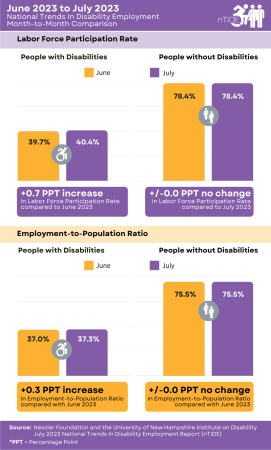Is New Jersey Really an Employment-First State? Hmm?
NJ claims to be an Employment First state for people with disabilities, yet the proposed $12,000 annual premium for people making less than a six-figure salary makes me go “Hmm?”’.
The reasoning behind the proposed premium is, even more, exasperating in its logic. The policy wonks believe that once the high income limits become effective there will be this huge influx of people with disabilities suddenly getting high-paying jobs who also need long-term support services during the first year. Seriously?
Why aren’t these people working now under WorkAbility? Hmm, perhaps they are sitting around waiting for these positions to appear. Or perhaps people with disabilities face many more barriers to being employed. Which scenario is more rooted in reality?
The latest National Trend in Disability Employment (nTIDE) from NJ’s Kessler Foundation may help in defining the current reality of those other barriers. Hmm, a seven-tenth of one percent increase over 30 days nationally. Certainly, that is a positive trend for people with disabilities, but does it support the current thinking behind the premium proposal that, somehow, all these other barriers will disappear creating this stampede of people with disabilities obtaining gainful employment once these income limits are increased?
This reasoning ignores that the WorkAbility reform intended to allow people already working and on WorkAbility to have salary increases without endangering their long-term support services needed to work. High pay means paying more taxes, which may actually be a net savings to the program. Allowing the current WorkAbility recipients to get higher salaries does not increase the program’s costs. They stay the same no matter what the recipient is paid.
Yes, in the coming years, WorkAbility will get more people applying; yes, a cost-sharing premium may be needed at some point. But let the people on the program now have a chance to increase their incomes before imposing this additional tax on us. It’s not equitable or fair, and it’s based on faulty assumptions.

